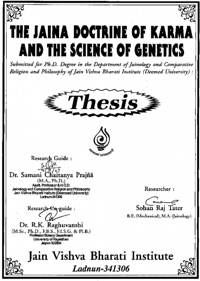We saṁsarī living beings, are constituted of two dravyas, jīva and ajīva. Ātmā is formless and invisible, and it is everywhere in our body. In saṁsārī (worldly-non liberated) jīvas, cetanā (quality of ātmā, consciousness) is associated by karma particles everywhere in our body. Also, karma particles are everywhere in the space. As long as they are not associated with cetanā (quality of ātmā-consciousness) they are ineffective. Our activities - "like and dislike" (attachment and aversion) work as a magnet and attract karma particles. When they associate with our soul they are called karma. Karma and soul have been associated since time immemorial. Every moment we are adding karma continuously due to our activities of attachment and aversion. Often we have partial separation meaning disassociation of some karma through austerities (tapas). Karmaśarīra is the hindrance (obstacle) that does not allow us to realize the true qualities of soul, does not let us become what we should be by our own nature, does not let us become paramātmā from ātmā. Kevalīs (siddhas) do not have any association with kārmaṇ śarīra, we all want to achieve this state.
The relation between the spirit and non-spirit is responsible for the worldly existence. Apart from the gross body, there is a subtle body which serves as a link between spirit and non-spirit. The soul, with the Jains undergoes a change every moment although never losing its density. The soul has a number of potencies and each moment of its existence is an integration of these potencies. The nature of karmic body at any moment is determined by this integrated existence of the soul. The soul is pure and perfect in its intrinsic nature. It is only due to its relation with karma that the soul comes to have passions (kaṣāya). And the relation being beginningless, the problem which of the two - the passions and the karma - come first does not arise.[82]
In pancāstikāya, referring to the long ago linkage between soul and karmic matter as "soul karmic matter cycle". It is mentioned that, "the mundane soul which is bound in the cycle of birth and death, has the effect of love and hatred. These effects attract new karma. Karma leads to birth in various states. Birth produces a body, a body possesses senses, senses enjoy their subjects, interest in subjects gives rise to love and hatred. Thus, with emotions of mundane soul arise karmic pudgalas, with karmic pudgala arise emotions. This flow is beginningless and infinite with reference to non-awakened soul and beginningless and finite with reference to awakened soul.[83] The conclusion is that when other Philosophical systems call action and saṁskār of soul as karma Jaina Philosophy calls the concrete karmic matter attached to soul as karma caused by love and hatred emotions of the soul.
 Prof. Dr. Sohan Raj Tater
Prof. Dr. Sohan Raj Tater
 Doctoral Thesis, JVBU
Doctoral Thesis, JVBU